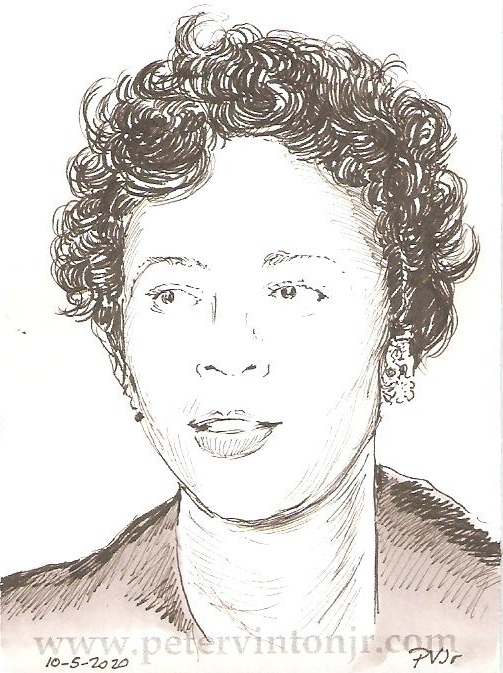
An ongoing illustrative history study
This piece originally posted 12/21/2020
Prelude | 57 | 58 | 59 | 60 | 61 | 62 | 63 | 64 | 65 | Email |
|---|
"No man or woman who tries to pursue an ideal in his or her won way is without enemies."
Daisy Bates's story begins horrifyingly enough --shortly after her birth in 1914 Arkansas, her mother was murdered (some accounts unapologetically use the word lynched) by three white men. Her father fled, and left Daisy in the care of family friends, Orlee and Susie Smith. Years later Daisy would come to understand what had happened to her mother, and moreover that the killers had never been found nor was law enforcement particularly interested in pursuing the case. Her adoptive father Orlee admonished her not to give in to hate, but to use her outrage constructively.
At the age of fifteen Daisy married salesman Lucius Bates, and together they established the Arkansas State Press, a weekly newspaper advocating for civil rights. They also joined the local NAACP chapter in Little Rock, which would offer a unique front-row vantage point for Daisy to chronicle the goings-on at Little Rock Central High School in the wake of the 1954 Brown v. Board of Education ruling. Bates walked to school with the Little Rock Nine every day for the entire school year, drawing (of course) death threats, which ultimately forced the closure of her and her husband's newspaper. Her actions in turn caught the attention of Dr. Martin Luther King, and she took on a leadership role with the Southern Christian Leadership Conference (SCLC). In 1963 Bates was one of the speakers at the March on Washington.
Daisy and Lucius moved to Washington, D.C. to support President Lyndon Johnson, and for a time Daisy even served in the Johnson administration working on anti-poverty initiatives. Later the Bateses moved back to Little Rock; after Lucius's death Daisy even made a point of reviving the Arkansas State Press. Her 1986 memoir received an American Book Award, the state named the third Monday in February as Daisy Gatson Bates Day, and in 1996 she carried the Olympic torch in Atlanta, Georgia.
Learn more about Daisy Bates's remarkable life at: https://www.pbs.org/video/independent-lens-a-civil-rights-hero-who-put-her-life-on-the-line/
Next page - Lesson 62: Robert Franklin Williams